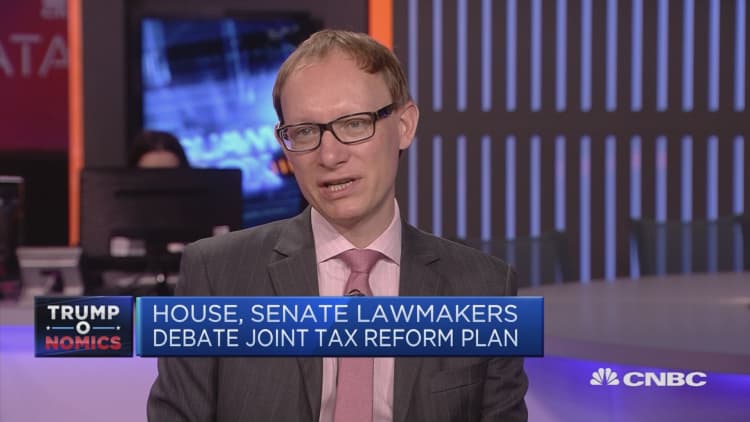
The continuing rapid ascent of global equities combined with rising interest rates has some financial analysts predicting inevitable recession in the near future.
"We think the (Federal Reserve) will continue to tighten pretty steadily over the course of the next couple of years or so, but we're starting to think that the end of the cycle, you can start to see it now. So we're saying 2019: recession," Robin Bew, CEO of the Economist Intelligence Unit, told CNBC on Tuesday.
Central banks are gradually tightening monetary policy, moving to raise interest rates and withdraw the stimulus they pumped into their economies following the 2008 financial crisis.
More hawkish positions from the U.S. Federal Reserve to the European Central Bank have rattled some investor sentiment, as the former aims to shrink its balance sheet and the latter draws down its quantitative easing program.
Bew said that as the U.S. economy grows and unemployment continues to fall, it is "gradually soaking up more spare capacity," or more slack in the economy. "Our team is already thinking about when that's going to go wrong for the U.S. economy." He believes that year will be 2019.
Liquidity provided by central banks is "the central piece that we have to understand, to make sure we understand how the market reacts," argued Sonja Laud, head of equity at Fidelity International.
Shrinking liquidity can result in a sell-off of equities, Laud warned. "If we take away excess liquidity, you will obviously find the odd bottleneck in some parts of the market where you cannot freely trade as you thought you could," Laud added. "And then normally what does happen is you sell the most liquid asset class available, and equities is normally the area of choice."
Tightening liquidity combined with what's been widely described as an overvalued stock market has for some time now been prompting the question of whether a crash is around the corner. However, a tightening fiscal policy doesn't inevitably lead to a market crash, and there are analysts that believe stock markets will continue to push higher over the coming years.
The prolonged period of investor optimism of the last few years — the second-longest bull market in history — has seen stock prices climb to record highs. Adjectives like "inflated" and "overstretched" are used daily to describe stock market valuations, pointing to what many analysts warn will lead to an eventual market correction or even a full-blown recession.
The Dow Jones industrial average has spiked 5,500 points in the last year, with the U.S. benchmark hitting an all-time high of 24,536 points on Monday before settling to 24,400. Retail stocks are currently booming as confidence grows in the U.S. government's ability to pass a Republican-led tax plan that promises to slash corporate tax rates from 35 percent to 20 percent.
Meanwhile, Germany's benchmark DAX and the U.K.'s FTSE 100 both hit all-time highs in November.
History points to lofty valuations preceding market crashes: indeed, the Daily Telegraph reported that the only times market valuations have been higher than today's (adjusted for inflation) were just before the dotcom bubble of the late 1990s and the 1929 Wall Street crash.


